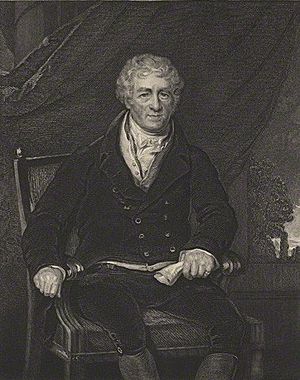Sir Robert Peel, 1st Baronet facts for kids
Quick facts for kids
Sir
Robert Peel
|
|
|---|---|

Engraving of Sir Robert Peel, 1st Baronet, by John Henry Robinson (mid 19th century)
|
|
| Member of Parliament for Tamworth |
|
| In office 1790–1820 |
|
| Preceded by | John Calvert |
| Succeeded by | Lord Charles Townshend |
| Personal details | |
| Born | 25 April 1750 |
| Died | 3 May 1830 |
| Spouse | Ellen Yates |
| Children |
|
| Occupation |
|
Sir Robert Peel, 1st Baronet (born April 25, 1750 – died May 3, 1830), was an important British politician and factory owner. He was one of the first big textile manufacturers during the Industrial Revolution. He became very wealthy, being one of only ten known millionaires in Britain by 1799.
He was also the father of Sir Robert Peel, who later became the Prime Minister of the United Kingdom twice.
Contents
Who Was Sir Robert Peel?
Sir Robert Peel came from a family of farmers and textile workers. His father, Robert Peel, and grandfather, William Peel, were involved in making textiles. Back then, much of this work was done at home.
Building Factories and Wealth
As the Industrial Revolution began, new machines like the water frame were invented. These machines needed water power. So, factories called spinning mills were built next to rivers.
Sir Robert Peel teamed up with others to build these mills. One of his first mills was at Burrs, near Bury. He also built homes for his workers there. It was hard to find enough workers in the countryside. So, many factories, including Peel's, hired poor children as "apprentices." These children often lived in special hostels.
Peel was a very successful businessman. He owned and managed cotton processing and cloth manufacturing businesses. He also had a calico-printing business. His hard work and smart investments made him a millionaire. He lived in a large home called Chamber Hall in Bury, where his famous son was born. He also helped fund the Manchester Bolton & Bury Canal.
Becoming a Politician
In 1790, Sir Robert Peel became a Member of Parliament for Tamworth. He was a strong supporter of the government and its leader, William Pitt the Younger. This was a bit unusual because many factory owners in his area had different political views.
He bought land and property in the Tamworth area, which helped him get elected. He made Drayton Manor in Staffordshire his main home. He started living like a country gentleman. In 1800, he was given the title of Baronet.
Helping Child Workers
Sir Robert Peel was concerned about the working conditions for children in cotton factories. He found out that some of his own mills were not being run as kindly as he wanted.
In 1802, he helped pass a law called the Health and Morals of Apprentices Act. This law aimed to limit the hours that child apprentices worked. It also made factory owners provide some schooling for them.
Later, in 1815, he pushed for even stricter rules. He wanted to limit the hours all children worked in textile mills. This led to the Cotton Mills and Factories Act in 1819. This law, though changed a bit, helped improve conditions for children in cotton factories.
In 1817, he stopped working in business. He left Parliament in 1820.
His Family
Sir Robert Peel married Ellen Yates in 1783. They had eleven children together. Their most famous child was Sir Robert Peel, 2nd Baronet, who became Prime Minister.
Other children included:
- William Yates Peel, who was also a politician.
- Edmund Peel, another politician.
- General Jonathan Peel, a soldier and politician. He also owned famous racehorses.
- Laurence Peel, a politician.
- Harriet Peel, who married the 2nd Baron Henley.
- Mary Peel, who married George Robert Dawson, a politician.
Sir Robert Peel had high hopes for his children, especially his eldest son, Robert. He wanted Robert to be very successful in society and politics.
After his first wife died, Sir Robert married Susanna Clerke in 1805. This marriage did not work out, and they separated. Susanna died in 1824.
Sir Robert Peel passed away peacefully in his armchair in May 1830. He had lived a good life, full of family joys and success. His funeral was attended by many people, including local officials and tenants.
 | Georgia Louise Harris Brown |
 | Julian Abele |
 | Norma Merrick Sklarek |
 | William Sidney Pittman |

